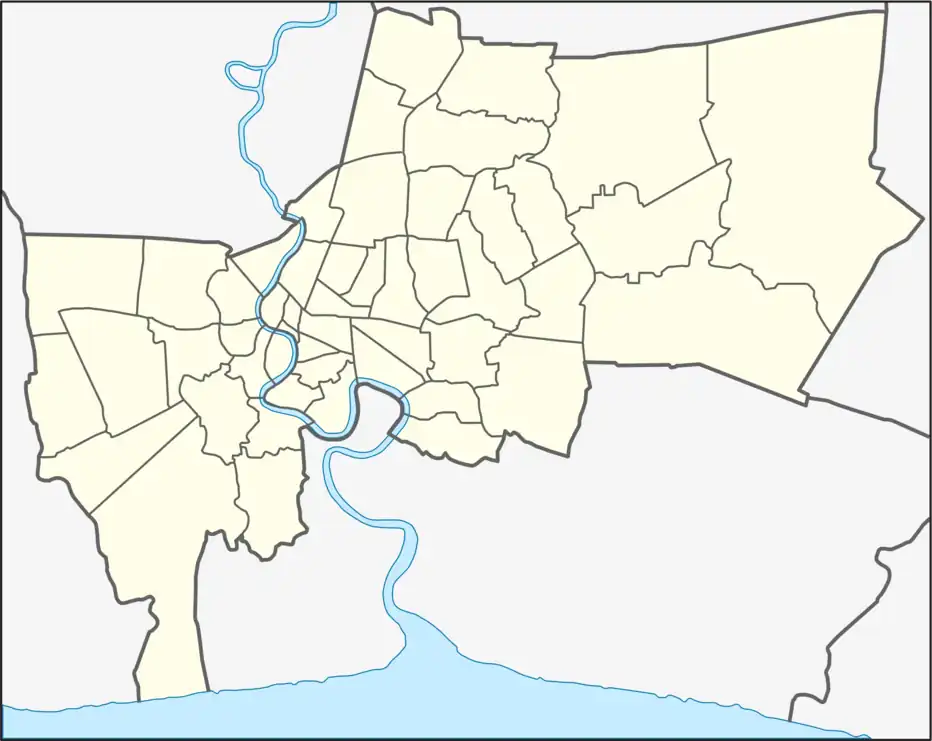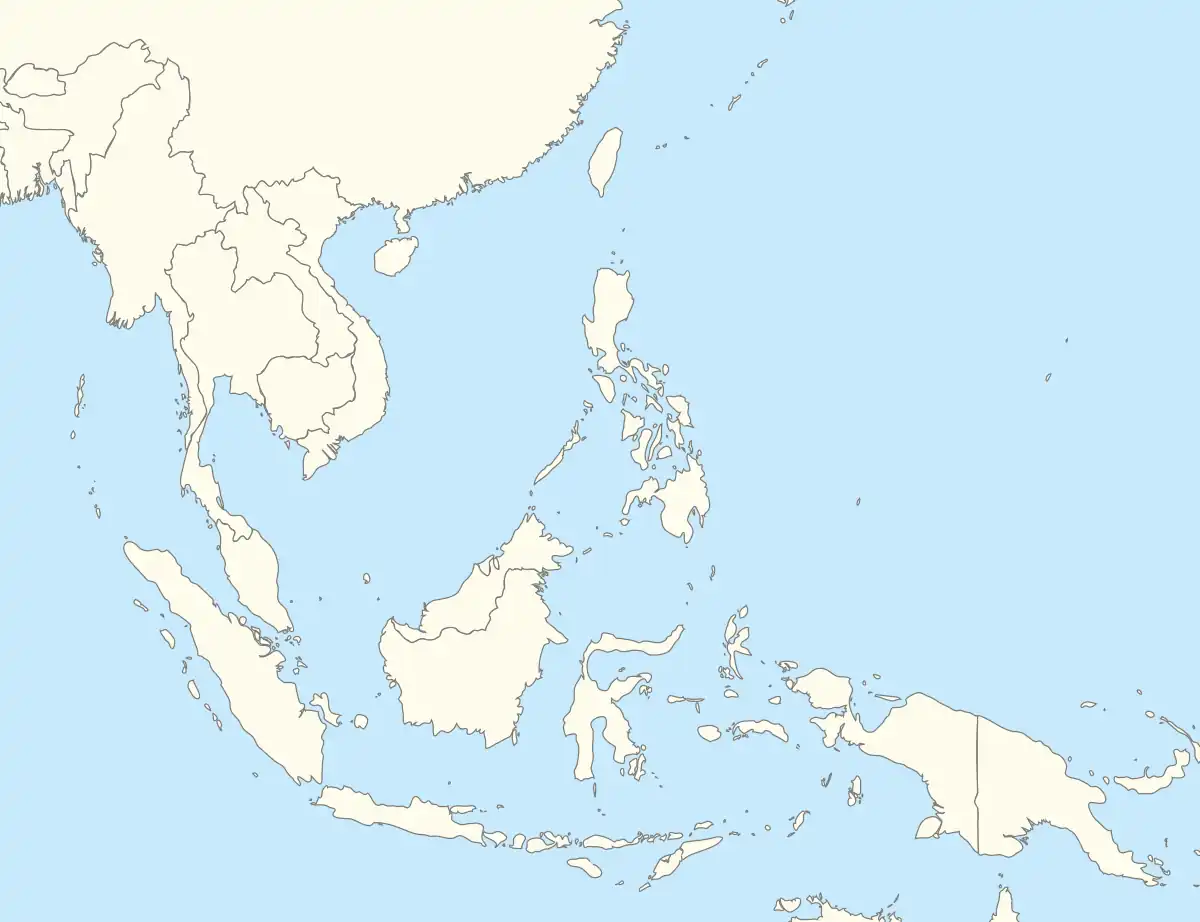Suvarnabhumi Airport
Suvarnabhumi Airport (Thai: ท่าอากาศยานสุวรรณภูมิ, RTGS: Tha-akatsayan Suwannaphum, pronounced [tʰâː.ʔāː.kàːt̚.sā.jāːn.sùʔ.wān.nā.pʰūːm] ⓘ;[3] from Sanskrit सुवर्णभूमि (Suvarṇabhūmi), literally 'golden land') (IATA: BKK, ICAO: VTBS), also known unofficially as Bangkok International Airport,[4][5] is the main international airport serving Bangkok, Thailand.[6][7] Located mostly in Racha Thewa, Bang Phli, Samut Prakan, it covers an area of 3,240 ha (32.4 km2; 8,000 acres), making it one of the biggest international airports in Southeast Asia and a regional hub for aviation. The airport is also a major Cargo Air Freight Hub (20th busiest in 2019), which has a designated Airport Free Zone, as well as road links to the Eastern Economic Corridor (EEC) on Motorway 7.[8]
Suvarnabhumi Airport ท่าอากาศยานสุวรรณภูมิ | |||||||||||||||||||
|---|---|---|---|---|---|---|---|---|---|---|---|---|---|---|---|---|---|---|---|
 | |||||||||||||||||||
_AN1822384.jpg.webp) | |||||||||||||||||||
| Summary | |||||||||||||||||||
| Airport type | Public | ||||||||||||||||||
| Owner/Operator | Airports of Thailand PCL (AOT) | ||||||||||||||||||
| Serves | Bangkok Metropolitan Region | ||||||||||||||||||
| Location | Racha Thewa, Bang Phli, Samut Prakan, Thailand | ||||||||||||||||||
| Opened |
| ||||||||||||||||||
| Hub for | |||||||||||||||||||
| Focus city for | |||||||||||||||||||
| Operating base for | |||||||||||||||||||
| Elevation AMSL | 5 ft / 2 m | ||||||||||||||||||
| Coordinates | 13°41′33″N 100°45′00″E | ||||||||||||||||||
| Website | suvarnabhumi | ||||||||||||||||||
| Maps | |||||||||||||||||||
| Runways | |||||||||||||||||||
| |||||||||||||||||||
| Statistics (2022) | |||||||||||||||||||
| |||||||||||||||||||
Sources:AOT 2019[2] | |||||||||||||||||||
The airport faced several delays to completion in part due to corruption allegations, and faced operational issues after opening in 2006.
Etymology
The name Suvarnabhumi is Sanskrit for "land of gold" (Devanagari:सुवर्णभूमि IAST: Suvarṇabhūmi; Suvarṇa[9] is "gold", Bhūmi[10] is 'land'; literally "golden land"). The name was chosen by the late King Bhumibol Adulyadej whose name includes Bhūmi, referring to the Buddhist golden kingdom, thought to have been to the east of the Ganges, possibly somewhere in Southeast Asia. In Thailand, government proclamations and national museums insist that Suvarnabhumi was somewhere on the coast of the central plains, near the ancient city of U Thong, which might be the origin of the Indianised Dvaravati culture.[11] Although the claims have not been substantiated, the Thai government named the new Bangkok airport Suvarnabhumi Airport, in celebration of this tradition.
History
_at_Suvarnabhumi_International_Airport.jpg.webp)
The airport is currently the main hub for Thai Airways International, Thai Smile and Bangkok Airways, as well as the operating base for Thai VietJet Air, Thai AirAsia and Thai AirAsia X. It also serves as regional gateway and connecting point for various foreign carriers connecting to Asia, Oceania, Europe and Africa.
Suvarnabhumi was officially opened for limited domestic flight service on 15 September 2006, and opened for most domestic and all international commercial flights on 28 September 2006.[12]
The airport is on what had formerly been known as Nong Nguhao (Cobra Swamp) in Racha Thewa in Bang Phli, Samut Prakan province as well as the districts of Bang Kapi, Lat Krabang, Bang Na and Prawet in the eastern side of Bangkok, about 25 kilometres (16 mi) from downtown. The terminal building was designed by Helmut Jahn of Murphy/Jahn Architects. It was constructed primarily by ITO JV. The airport had the world's tallest free-standing control tower (132.2 metres or 434 feet) from 2006 to 2014,[13] and the world's fourth largest single-building airport terminal (563,000 square metres or 6,060,000 square feet).
Suvarnabhumi is the 17th busiest airport in the world,[14] eleventh busiest airport in Asia, and the busiest in the country, having handled 60 million passengers in 2017,[14] and is also a major air cargo hub, with a total of 95 airlines. On social networks, Suvarnabhumi was the world's most popular site for taking Instagram photographs in 2012.[15]
Suvarnabhumi reassigned the IATA airport code, BKK, from Don Mueang after the previous airport ceased international commercial flights. Motorway 7 connects the airport, Bangkok, and the heavily industrial eastern seaboard of Thailand, where most export manufacturing takes place.
_AN1907895.jpg.webp)
During the COVID-19 pandemic, the airport was temporarily converted to a hospital[16] and vaccination center.[17]
Land purchase, initial early phase of construction
The need for the new airport was recognized in 1973 when 8,000 acres (3,200 ha) of land was purchased 40 kilometres (25 mi) east of Bangkok. The site, known as Cobra Swamp, was drained and named Suvarnabhumi, meaning "realm of gold". On 14 October 1973, student-led protests led to the overthrow of the military government of Prime Minister Thanom Kittikachorn and the project was shelved.
Suvarnabhumi Airport's development began to take shape in 1992-1993 during the Chuan Leekpai government when the master plan was created. This master plan was prepared by the consulting group of Airports of Thailand Public Company Limited (AOT), with Louis Berger International Inc., a well-known American consulting company, also joining in. On November 20, 1997, Prime Minister Chuan Leekpai declared his intention to accelerate the airport's construction with a budget of 120 billion baht, as approved by the Cabinet around 1994.[18]
However, after a series of ups and downs, the 'New Bangkok International Airport' company (NBIA) was finally formed in 1996.[19] Due to political and economic instabilities, notably the Asian financial crisis of 1997, construction did not commence until six years later in January 2002 by the government of Thaksin Shinawatra. During the Thaksin Shinawatra government in 2001-2002, an auction was held to build Terminal 1. While the winning bid initially exceeded the budget, the government made modifications, reducing the cost to 36,000 million baht. As a result, Terminal 1 wasn't fully constructed according to the master plan, leaving vacant space on the east and west, necessitating future expansion by AOT.[18]
Airport tests, and official opening
The airport was due to open in late 2004, but a series of budget overruns, construction flaws, and allegations of corruption plagued the project.
A further delay was caused by the discovery that the airport had been built over an old graveyard. Superstitious construction workers claimed to have seen ghosts there. On 23 September 2005, the Thai airports authority held a ceremony where 99 Buddhist monks chanted to appease the spirits.[20]
Full tests of the airport took place on 3 and 29 July 2006. Six airlines — Thai Airways International, Nok Air, Thai AirAsia, Bangkok Airways, PBair, and One-Two-GO — used the airport as a base for twenty domestic flights.[21][22] The first international test flights were conducted on 1 September 2006. Two Thai Airways aircraft, a Boeing 747-400 and an Airbus A300-600, simultaneously departed the airport at 09:19 to Singapore and Hong Kong respectively. At 15:50 the same aircraft flew back and made simultaneous touchdowns on runways 19L and 19R. These test flights demonstrated the readiness of the airport to handle traffic.
On 15 September 2006, the airport started limited daily operations with Jetstar Asia Airways operating three Singapore to Bangkok flights. Bangkok Airways moved to the airport on 21 September. AirAsia and Thai AirAsia followed on 25 September and on 26 September Nok Air moved to Suvarnabhumi Airport. During this initial phase, as well as in the previous tests, the airport used the temporary IATA code NBK.[23]
Suvarnabhumi officially opened at 03:00 on 28 September 2006, taking over all flights from Don Mueang. The first flight to arrive was a Lufthansa Cargo flight LH8442 from Mumbai at 03:05.[24] The first commercial arrival was Japan Airlines at 03:30. The first passenger arrival was Aerosvit flight VV171 from Kyiv at 04:30, and the first cargo departure was Saudi Arabian Airlines flight SV-984 to Riyadh at 05:00.[25] Aerosvit also had the first passenger departure (VV172 to Kyiv) around 05:30.[26]
Initial difficulties
Difficulties were reported in the first few days of the airport's operation. On the first day alone, sluggish luggage handling was common—the first passenger arrival by Aerosvit took an hour for the luggage to start coming out, and some flights did not have their luggage coming out even after four hours. Flights were delayed (Thai Airways claimed that 17 of 19 flights were delayed that day), and there were failures with the check-in system.[27][28] Subsequent problems included the failure of the cargo computer system, and the departure boards displaying the wrong information, resulting in confused passengers (especially as unlike Don Mueang, there were no "final calls" issued).[29]
Months after its opening, issues of congestion, construction quality, signage, provision of facilities, and soil subsidence continued to plague the project, prompting calls to reopen Don Mueang to allow for repairs to be made.[30] Expert opinions varied widely on the extent of Suvarnabhumi's problems as well as their root cause. Most airlines stated that damage to the airport was minimal.[31][32] Then Prime Minister Surayud Chulanont reopened Don Mueang for domestic flights on a voluntary basis on 16 February 2007, with 71 weekly flights moved back initially, but no international flights.[33]
Tarmac problems
In January 2007, ruts were discovered in the runways at Suvarnabhumi.[34] The east runway was scheduled to close for repairs. Expert opinions varied as to the cause of the ruts.[31] Airport authorities and airline representatives maintained that the airport was still safe and resisted suggestions that the airport should be completely closed and all flights moved back to Don Mueang.[35]
On 27 January 2007, the Department of Civil Aviation declined to renew the airport's safety certificate, which had expired the previous day. The ICAO requires that international airports hold aerodrome safety certificates, but Suvarnabhumi continued to operate because the ICAO requirement had yet to be adopted as part of Thai law.[36]
As of early 2016, tarmac problems persisted at Suvarnabhumi. Soft spots on the tarmac, taxiways, and apron area had not been permanently fixed. Aircraft were getting stuck on the soft surfaces that are the result of sub-standard materials. "The constant resurfacing of the tarmac, taxiways and apron area with asphalt is an unacceptable patchwork solution. We literally need a "concrete" solution", said Tony Tyler, IATA's director general and CEO.[37]
Plans to re-open Don Mueang for domestic flights
In January 2007, Thai Airways announced a plan to move some of its domestic operations back to Don Mueang International Airport due to overcrowding. Three days later, the Ministry of Transport recommended temporarily reopening Don Mueang while repair work on the runways at Suvarnabhumi proceeded. At that time, Thai Airways said it would shift most of its domestic flights back to Don Mueang while keeping flights with high international passenger connections such as Chiang Mai and Phuket at Suvarnabhumi. On 28 March 2009, Thai Airways discontinued all domestic flights from Don Mueang. Bangkok Airways and One-Two-GO Airlines had similar plans, but Bangkok Airways remained at Suvarnabhumi. Thai AirAsia said it would not move unless it could shift both its international and domestic operations, prompting them to stay at Suvarnabhumi for the time being. Nok Air and PBair were undecided, but Nok Air later relocated all flights to Don Mueang, where they operate today.[38][39] As of January 2010, only Nok Air and One-Two-GO operated domestic flights from Don Mueang Airport. PBair have ceased operations altogether. One-Two-GO was integrated into Orient Thai Airlines in July 2010, but continues to operate from Don Mueang Airport. As of 1 October 2012, Air Asia has moved all of its Bangkok operations to Don Mueang International Airport (DMK) from Suvarnabhumi Airport (BKK).[40]
Repair and upgrades
Airports of Thailand found that the cost of fixing 60 identified problems at the airport would be less than one percent of the total airline cost and the problems could be fixed in up to four to five years. Dr Narupol Chaiyut, a member of a committee overseeing service problems at the new airport, estimated that 70 percent of the problems would be fixed in 2007. Twenty of the 60 problems were successfully fixed by February 2007.[41]
Architectural design
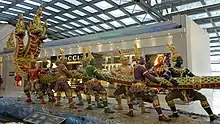
.jpg.webp)
Suvarnabhumi Airport's main terminal roof is designed with structural elements and bays placed in a cantilevered, wavelike form to appear to "float" over the concourse beneath. This overall design principle was to express the former essence of the site, from which water had to be drained before construction could begin. The eight composite 2,710-ton trusses supporting the canopy of the main terminal are essentially diagrams of the bending moments acting on them, with the greatest depth at mid-span and over the supports.[42]
The result of Helmut Jahn's vision is a structure with performance materials serve in their total composition and in use more than in their conventional roles. This maximizes daylight use in comfort with substantial energy life-cycle cost savings. The installed cooling system reduced up to 50 percent compared to a conventional system. A translucent membrane with three layers was developed to mediate between the interior and exterior climate, dealing with noise and temperature transmission, while still allowing natural flow of daylight into building along with views of greenery outside.[43]
Airport ranking
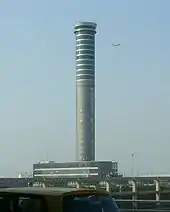
The airport was ranked number 48 among the world's top 100 airports in 2020. Other ASEAN airports in 2020 were ranked: Singapore Changi Airport, 1; Kuala Lumpur International Airport, 63; Jakarta, 35; Hanoi, 87.[45] Suvarnabhumi was ranked 46 in 2019,[46] 38 in 2017[47] and 36 in 2016.[48] According to the Thailand Development Research Institute (TDRI) in 2018, the airport's ranking had not improved over the past six years. Customer complaints include: lengthy immigration waiting times; transit day room issues; insufficient numbers of chairs and phone charging points; insufficient English-speaking staff; and poor information displays.[49][50]
Events
On 25 January 2007, due to work upgrading the taxiways which suffered from small cracks, a few incoming flights were delayed and several flights were safely diverted to U-Tapao International Airport in Rayong Province.[51]
On 26 November 2008, an illegal occupation of the airport took place by People's Alliance for Democracy, closing the departure lounge and blocking exits and leaving almost 3,000 passengers stranded in the main terminal and another 350,000 stranded inside the country, as all flights were grounded. The People's Alliance for Democracy seized the control tower at 12:00.[52] On 2 December 2008, protesters agreed to leave the airport as they had been illegally protesting and permitted the resumption of flights. Security checks, clean-ups, and re-certification once the illegal occupation ended delayed the airport from being fully functional until 5 December 2008.[53]
In January 2021, a motorist drove his car through security gates and onto the tarmac at the airport while it was in use. It was later revealed that the driver had been under the influence of methamphetamine, which were also discovered in the trunk of the car. The driver claimed that he had taken a wrong turn.[54][55]
Predatory irregularities
Petty thieves and confidence men, the majority of them illegal taxi drivers or tour guides, are known to prey on tourists in the arrival hall. They belong to politically well connected criminal groups: Kamnan Samruay, Boonruang Srisang, Sak Pakphanang, the Pattaya Mafia and Phuyai Daeng.[56] Evicting them has proved difficult as they allegedly are well connected. (The head of the Pirap gang is supposedly related to an Airports of Thailand executive, while the Phuyai Daeng has ties to influential civil servants in Samut Prakan.[56])
On 1 October 2010, two hundred armed men occupied the airport's parking area for an hour, blocking the building's entrances and seizing ticket booths to collect fares from motorists.[57] Airport security personnel failed to respond, reportedly because of an internal dispute within the parking management company, the firm contracted to run the parking facilities.[57]
Airport terminal and future expansion
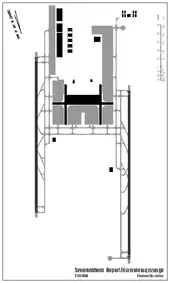
Airport terminal
Costing an estimated 155 billion baht (US$5 billion), the airport has two parallel runways (60 m wide, 4,000 m and 3,700 m long) and two parallel taxiways to accommodate simultaneous departures and arrivals.[58] It has a total of 120 parking bays (51 with contact gates and 69 remote gates), with five of these capable of accommodating the Airbus A380. Suvarnabhumi Airport has 72 jet bridges and 69 non-jet bridges. Additionally, flights are able to park at remote locations on the ramp, from which airport buses transport passengers to and from the terminal. Suvarnabhumi Airport has 18 jet bridges and 6 non-jet bridges for Airbus A380.
The airport's two runways can accommodate 64 flights per hour. At peak times the runways average 63 flights per hour. In April 2019 the Thai cabinet approved a sum of 21.8 billion baht for the construction of a third runway. Construction will start in 2019 and be completed in 2021. The third runway will accommodate a maximum of 30 flights per hour. The project will be managed by Airports of Thailand (AOT).[59]
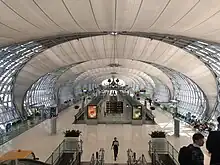
.jpg.webp)
The main passenger terminal building, with a capacity of handling 76 flight operations per hour, co-locates the international and domestic terminals, though assigning them to different parts of the concourse. In the initial phase of construction, it was capable of handling 45 million passengers and three million tonnes of cargo per year. Above the underground rail link station and in front of the passenger terminal building is a 600-room hotel operated by Accor under the Novotel brand. The airport's passenger terminal is the world's largest passenger terminal ever constructed in one phase at 563,000 square metres (6,060,000 sq ft), and is also currently the fourth biggest passenger terminal building in the world, after the Hong Kong International Airport (570,000 square metres or 6,100,000 square feet), Beijing Capital International Airport (990,000 square metres or 10,700,000 square feet), with the largest passenger terminal at Dubai International Airport (Terminal 3 is over 1,713,000 square metres or 18,440,000 square feet). The airport air-traffic control tower was the tallest in the world at 135 metres (443 ft) from 2006 to 2014.[13]
From the opening of Suvarnabhumi in 2006 to early 2017, eight people had fallen to their deaths from upper-floor walkways, prompting the airport to spend 33 million baht in 2013 building glass barriers to prevent people from falling and/or taking their lives.[60]
Future expansion
By mid-2015, the airport was handling more than 800 flights per day, higher than its 600-flight capacity. It has exceeded its capacity of 45 million passengers per year.[61]
Airports of Thailand (AOT) approved an investment budget for the expansion of Suvarnabhumi Airport and construction was expected to be completed by April 2023.[62] The plan was to strengthen Suvarnabhumi Airport's position as a regional aviation hub. Phase Two would raise the airport's capacity to 65 million passengers a year and would be undertaken in parallel with the construction of a new domestic terminal.[63] The new domestic terminal will be intended to accommodate more than 30 million passengers annually.[64]
The two expansion projects are part of the overall airport enlargement that would see Suvarnabhumi raise its annual passenger handling capacity to 125 million passengers, 90 million international and 35 million domestic passengers by 2024 at an estimated cost of 163 billion baht (US$5.25 billion/€3.62 billion). The expansion includes the construction of one additional runway, subsequent enlargement of domestic and international terminals, and improvements to parking bays, car parks, and other airport infrastructure.[65]
Once completed the expansion plans to increase passenger capacity of Suvarnabhumi Airport to 65 million per year. The new satellite passenger concourse will be linked to the current main terminal via an underground automated people mover (APM) system that was voted by the AOT board during a 17 May 2012 meeting. The new people mover is being provided by Siemens using the VAL technology.[66] The expansion also includes a plan to expand the airport parking garage as well as the expansion of the eastern end of the main passenger terminal by 135 metres (443 ft) along with the construction of a new airline office building. The expansion includes plans to construct a third runway of 3,700 metres (12,100 ft). According to the Bangkok Post, the new satellite terminal will have a total of 28 gates, with eight for the Airbus A380 super jumbo jet.[67]
The new passenger terminal will be used only by Bangkok Airways and flag carrier Thai Airways International (and its regional subsidiary Thai Smile). Upon completion of the satellite terminal, other Star Alliance members will be given the check-in concourse of Thai Airways.[68]
The satellite terminal, known as SAT-1, is expected to soft-open in September 2023 and fully open from early 2024.[69]
Airlines and destinations
Passenger
Cargo
Passenger traffic and statistics
Busiest international routes
| Rank | Airport | Passengers handled 2019 |
% Change 2018/19 |
|---|---|---|---|
| 1 | Hong Kong | 3,756,449 | |
| 2 | Singapore | 3,258,422 | |
| 3 | Seoul–Incheon | 2,689,306 | |
| 4 | Taipei–Taoyuan | 1,928,536 | |
| 5 | Dubai–International | 1,707,276 | |
| 6 | Shanghai–Pudong | 1,600,930 | |
| 7 | Guangzhou | 1,510,461 | |
| 8 | Ho Chi Minh City | 1,238,942 | |
| 9 | Tokyo–Haneda | 1,230,506 | |
| 10 | Manila | 1,179,861 |
| Rank | Airport | Tons of cargo handled 2019 |
% Change 2018/19 |
|---|---|---|---|
| 1 | Hong Kong | 172,977 | |
| 2 | Singapore | 99,397 | |
| 3 | Taipei–Taoyuan | 92,475 | |
| 4 | Tokyo–Narita | 61,431 | |
| 5 | Seoul–Incheon | 50,125 | |
| 6 | Doha | 46,884 | |
| 7 | Shanghai–Pudong | 39,042 | |
| 8 | Tokyo–Haneda | 39,042 | |
| 9 | Dubai–International | 27,479 | |
| 10 | London–Heathrow | 25,450 |
Traffic by calendar year
Suvarnabhumi accounted for the largest share of air traffic at Thailand's airports in 2015, handling 52.9 million passengers, up by nearly 14 percent from the previous year despite its passenger capacity of only 45 million a year. International passengers passing through Suvarnabhumi grew 15.9 percent to 44.2 million, while domestic volume edged up 4.87 percent to 8.68 million. Aircraft movements showed a 9.5 percent increase to 317,066, consisting of 247,584 international (up 11 percent) and 69,482 domestic (up 4.4 percent).[196]
| Year | Passengers | Change from previous year |
Movements | Cargo (tons) |
Notes |
|---|---|---|---|---|---|
| 2008 | 38,603,490 | – | – | 1,173,084 | |
| 2009 | 40,500,224 | – | 1,045,194 | ||
| 2010 | 42,784,967 | – | 1,310,146 | ||
| 2011 | 47,910,744 | 299,566 | – | ||
| 2012 | 53,002,328 | 312,493 | – | Source: Airports Council International[197] In 2012, the government enjoined all low-cost airlines to move their hubs to DMK in October. | |
| 2013 | 51,363,451 | 288,004 | 1,236,223 | ||
| 2014 | 46,423,352 | 289,568 | 1,234,176 | ||
| 2015 | 52,902,110 | 317,066 | 1,230,563 | ||
| 2016 | 55,892,428 | 336,354 | 1,306,435 | [198] | |
| 2017 | 60,860,704 | 350,508 | 1,439,913 | ||
| 2018 | 63,379,077 | 369,476 | 1,494,599 | [199] | |
| 2019 | 65,425,879 | 380,051 | 1,324,268 | [200] | |
| 2020 | 16,706,235 | 152,614 | 904,362 | [201] | |
| 2021 | 5,663,701 | 111,729 | 1,120,357 | [201] | |
| 2022 | 28,754,350 | 221,331 | 1,184,157 | [202] | |
Incidents
- 8 September 2013: Thai Airways International Flight 679, an Airbus A330-300, (HS-TEF, Song Dao), arriving from Guangzhou Baiyun International Airport (CAN) had a runway excursion from runway 19L while landing in heavy rain with extensive damage to the airplane and the runway. All passengers and crew were evacuated with no serious injuries.[203] Preliminary investigation determined the cause of the incident to be the right landing gear collapsing as a result of a damaged bogie.[203] In the aftermath of the accident, Thai Airways had the logos of the aircraft painted over in black, prompting widespread criticism of attempted cover-up. An airline official initially said that the practice was part of the "crisis communication rule" recommended by Star Alliance. This was denied by the group, and Thai Airways later clarified that the "de-identifying" of aircraft was its own practice and not Star Alliance policy.[204][205] The controversy prompted discussion over the appropriateness and effectiveness of the practice as a brand-protection policy.[206] The aircraft was damaged beyond repair and written off as a hull loss.[207] The airframe has since been converted to a roadside attraction called Airways Land, featuring a cafe and event space, on Mittraphap Road in Sida District, Nakhon Ratchasima Province.[208]
- 29 September 2015: A Thai Airways airport dolly crashed into an airport cleaner at bay 511.[209]
- 1 August 2016: Thai Regional Airline Flight 106,[210] a Piper PA-31 Navajo (HS-FGB) arriving from Nakhon Ratchasima Airport with two passengers, crashed at Lam Phak Chi, Nong Chok district, Bangkok. In the incident, there was one fatality (the captain in command) and four injuries.
- 8 October 2018: Thai Airways International Flight 679, a Boeing 747-400 (HS-TGF, Sri Ubon) arriving from Guangzhou Baiyun International Airport (CAN), China, had a runway excursion from runway 19R while landing, causing damage to the airplane. No injuries were reported.[211] As of January 2020, the aircraft is being repaired at U-Tapao International Airport.[212]
- 1 July 2020: A Boeing 767-200(Z-WPF) flight UM462 with two passengers and 17 crew from Air Zimbabwe made an emergency landing because the left engine had shut down.[213]
- 24 July 2022: A Boeing 777-200 from Austrian Airlines, was enroute at FL320 about 240 nm northwest of Bangkok when the crew decided to return to Bangkok as a precaution due to a malfunctioning oven.
Ground transportation
Airport Rail Link (ARL)
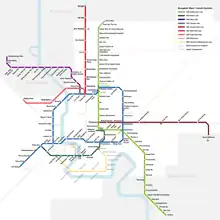
The 30 billion baht Suvarnabhumi Airport Link was opened on 23 August 2010,[214] after multiple delays. The Airport Rail Link (ARL) is operated by SRTET, a subsidiary company of the State Railway of Thailand. The standard gauge line is 28.6 kilometres (17.8 mi) long and is elevated for most of its length, running mostly above existing regional railway lines and parallel to Motorway 7 and Si Rat Expressway. There is a short at-grade/underground segment as the line approaches the passenger terminal building of Suvarnabhumi Airport.
The ARL Station is located on the Underground floor of Suvarnabhumi Airport which also links to the Airports' Novotel Hotel adjacent to the Main Terminal.
The ARL hours of service are 06:00 to 00:00.[215] The ARL has two interchange stations, namely Phaya Thai (changing for BTS Green Line services) and Makkasan (linking Phetchaburi station of the MRT Blue Line). In the future, the ARL will complement the SRT Red Line commuter service, which comprises two-meter gauge, dual-track lines. The ARL may also be extended from Phaya Thai to Don Mueang via Bang Sue Grand Station, given that the old Don Mueang International Airport has now been reopened for civil aviation under a dual-airport policy.
Regional train
Meanwhile, SRT provides a suburban commuter train service between Lad Krabang (the nearest station to Suvarnabhumi on the East line, one station from the airport by Airport Rail Link) and the northern suburban city of Rangsit via downtown Bangkok and the old Don Mueang Airport. The train also connects with BTS and MRT at Phaya Thai and Phetchaburi stations respectively. A shuttle bus service linking the airport with Hua Takhe railway station is provided by BMTA. The train service is currently not as popular as the bus service because it requires a shuttle bus connection. The service will be stopped when the Airport Express Link is completed.
Bus
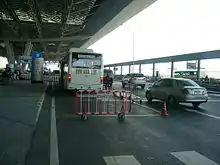
Northeast of the Airport is Suvarnabhumi Public Transport Center, which is the Airport's Main Bus Terminal.
A free bus service connecting Suvarnabhumi Airport and Don Mueang Airport operates from 05.00 until midnight. Three air-conditioned city bus routes are operated by Bangkok Mass Transit Authority (BMTA) serve the airport's dedicated bus terminal. There are also direct buses between the airports operated by Airport Shuttle Bus.
Taxi
Located on Level 1 (Ground Level) are where the Public Taxis are located. A ticket printed from the ticket queue machine (located on the same floor) is required before queuing up for a taxi.
Car
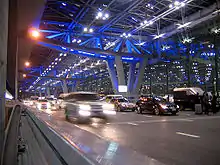
The airport has five main access routes. Among these the most convenient route is via the Bangkok Chon Buri Motorway (Motorway 7). Another main airport entrance is in Samut Prakan Province via the expressway from Bang Na to Bang Pakong.
The Airport has 7 different car park zones, with zone 2 & 3 having direct access to the departure/arrival terminal. Located northeast of the airport is the Longterm Car Park Zone, next to the Bus Terminal.
The airport has provided five entrance routes. The main route is via the motorway in the north of Bangkok, directly connecting Bangkok's downtown and Chonburi Province, the industrial and harbor city in eastern Thailand. However, another main airport entrance is in Samut Prakan Province, connecting an elevated highway in the south of Bangkok from Bang Na to Bang Pakong.
Automated People Mover
Skytrain for passenger transport under the runway connecting the current terminal with the new terminal. It will open for service on September 28, 2023, with a total distance of 1 kilometer, using a rubber-wheeled automatic train (Automated People Mover or APM), which uses train cars from Siemens company,Airval model, totaling 6. The train has 2 cars, each car has 25 seats, can accommodate approximately 210 passengers per train, runs 24 hours a day, has a service frequency of 3 minutes per train, and can transport up to 3,590 passengers per hour per direction.[216][217]
Sky Lane Cycle Track
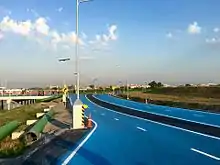
In December 2015, Airports of Thailand introduced Sky Lane (Thai: สกายเลน), a cycling track around the Suvarnabhumi airport perimeter. The entrance to Sky Lane is located in the northeastern corner of the airport area. Cyclists can bring their bicycles and bike here for free. The Sky Lane is a controlled-access, one-direction, two-lane track built only for cycling, so the riders can be ensured that they won't be bothered by any vehicle. The Sky Lane's length is 23.5 km, making it the longest in Asia.[218] Sky Lane's facilities, which are specially designed for cyclists, include medical facilities, shops, food & beverage, track, parking lot and a rest area. The entrance gate is open from 06:00 to 18:00.[219] On 23 November 2018, King Rama X presided over the official opening of cycling lane at Suvarnabhumi airport and denominated the track as Happy and Healthy Bike Lane.[220]
References
- Fernquest, Jon. "Suvarnabhumi: New runway by 2018". Bangkok Post. Retrieved 20 March 2019.
- "Air transport statistic 2016 summary" (PDF). Airports of Thailand PLC. 23 January 2017.
- "Suvarnabhumi Airport pronunciation: How to pronounce Suvarnabhumi Airport in Thai". Forvo.com. 20 January 2010. Retrieved 4 March 2017.
- "Bangkok Airport". BBC Three. 2015. Retrieved 21 December 2017.
Series in which young Brits pass through Bangkok Airport to embark on adventures of a lifetime.
- "Suvarnabhumi Airport (BKK) – Official Airports of Thailand (Bangkok Airport)". Retrieved 21 December 2017.
- "Don Mueang to be city budget air hub". Bangkok Post. Retrieved 2 July 2013.
- "AirAsia to shift to Don Mueang". Archived from the original on 29 October 2013. Retrieved 2 July 2013.
- An Update on the Progress of the High-Speed Railway connecting Three Airports
- "Sanskrit Dictionary". Sanskrit Dictionary. Retrieved 5 October 2018.
- "Sanskrit Dictionary". Sanskrit Dictionary. Retrieved 5 October 2018.
- Damrong Rachanubhab, "History of Siam in the Period Antecedent to the Founding of Ayuddhya by King Phra Chao U Thong", Miscellaneous Articles: Written for the Journal of the Siam Society by His late Royal Highness Prince Damrong, Bangkok, 1962, pp. 49–88, p. 54; Promsak Jermsawatdi, Thai Art with Indian Influences, New Delhi, Abhinav Publications, 1979, pp. 16–24. William J. Gedney, "A Possible Early Thai Route to the Sea", Journal of the Siam Society, Volume 76, 1988, pp. 12–16.
- "Bangkok's new airport opens to first commercial flights", USA Today, 15 September 2006.
- "Tallest Air Traffic Control Tower in the world". klia2.info. Retrieved 11 October 2017.
- "2017 Annual Airport Traffic Report" (PDF). Port Authority of New York and New Jersey. 10 April 2018. p. 28. Retrieved 1 May 2018.
- "Suvarnabhumi, Paragon top Instagram places list". Bangkok Post, 29 December 2012.
- "Thailand Builds COVID Hospital in Bangkok Airport - Travel Radar". Travel Radar - Aviation News. 29 July 2021. Retrieved 8 August 2021.
- With few travellers, Thailand turns airport into vaccination center
- สยามรัฐ (28 September 2021). "เปิดประวัติ ท่าอากาศยานสุวรรณภูมิ ที่เคยเป็นหนองงูเห่า". สยามรัฐ (in Thai). Retrieved 4 October 2023.
- Airport Technology (14 July 2023). "Suvarnabhumi International Airport, Thailand - Airport Technology". Airport Technology. Retrieved 4 October 2023.
- Richard Lloyd Parry, "Poo Ming – a blue ghost who haunts $4bn airport", The Times, 27 September 2006 Archived 10 May 2011 at the Wayback Machine
- ThaiDay, "THAI discounts tickets for historic test flights", 1 July 2006.
- "PM Thaksin says Suvarnabhumi Airport ready in two months", MCOT, 29 July 2006. Archived 13 October 2007 at the Wayback Machine
- A Brief History Of Bangkok Suvarnabhumi Airport
- Pennapa Hongthong, Just listen to our noisy nightmare Archived 29 October 2006 at the Wayback Machine, The Nation, 28 September 2006
- Petchanet Pratruangkrai, Suchat Sritama, Exporters pan new export fees Archived 3 March 2016 at the Wayback Machine, The Nation, 27 September 2006
- Kurt Hofmann, LH Cargo set to be first into Suvarnabhumi, ATW, 28 September 2006 Archived 27 September 2007 at the Wayback Machine
- Suchat Sritma, Touch down...into chaos Archived 11 October 2006 at the Wayback Machine, 29 September 2006
- e-Travel Blackboard, Baggage ruffles up some feathers, but Suvarnabhumi still a success, 29 September 2006 Archived 27 September 2007 at the Wayback Machine
- The Nation, Airport shippers hit by computer failure Archived 4 January 2007 at the Wayback Machine, 2 October 2006
- Some flight services will likely return the Don Muang Airport, The Nation, 29 January 2007. Archived 4 February 2007 at the Wayback Machine
- The Nation, Engineers unable to agree on root cause of airport cracks Archived 12 February 2007 at the Wayback Machine, 10 February 2007
- The Nation, THAI baulks at moving to Don Muang, 15 February 2007
- Thailand backtracks on plan for second international airport, Channel NewsAsia, 16 February 2007 Archived 18 February 2007 at the Wayback Machine
- A Rough Takeoff for Bangkok's New Airport, Time, 25 January 2007
- New airport's east runway to close for repairs, return to Don Muang mooted, Thai News Agency, MCOT, 27 January 2007. Archived 13 October 2007 at the Wayback Machine
- "Bangkok airport officially unsafe", CNN, 27 January 2007 Archived 29 January 2007 at the Wayback Machine
- "Thailand needs to do more for higher aviation competitiveness: IATA". The Nation. 18 February 2016. Retrieved 18 February 2016.
- Use Don Muang during repairs: 2 airlines Archived 2 February 2007 at the Wayback Machine, The Nation, 27 January 2007.
- Move to use 2 airports gets mixed reception Archived 2 February 2007 at the Wayback Machine, The Nation, 31 January 2007.
- AirAsia moves to Don Mueang Airport (1 October 2012), Air Asia, 13 August 2012. Archived 15 September 2012 at the Wayback Machine
- B1bn needed to fix terminal problems over four to five years, Bangkok Post, 16 February 2007
- Suvarnabhumi Airport, September 2008. University of Cincinnati. Archived 7 October 2011 at the Wayback Machine
- E-Architect, Suvarnabhumi Airport Bangkok, 15 August 2008
- "The World's Tallest Air Traffic Control Towers". Simple Flying. 23 November 2020. Retrieved 11 April 2021.
- "The World's Top 100 Airports of 2020". Skytrax. Retrieved 5 June 2020.
- "World's Top 100 Airports 2019". Skytrax. Retrieved 5 June 2020.
- "World's Top 100 Airports 2017". Skytrax. Retrieved 19 October 2018.
- "World's Top 100 Airports in 2016". Skytrax. Retrieved 19 October 2018.
- Wancharoen, Supoj; Raksaseri, Kornchanok (19 October 2018). "Poor service quality dogs airport ranking". Bangkok Post. Retrieved 19 October 2018.
- Limsamarnphun, Nophakhun (19 October 2018). "Planned airport terminal could cause chaos: experts". The Nation. Retrieved 19 October 2018.
- Thongrung, Watcharapong (26 January 2007). "Minister Admits: Some airlines afraid to use new airport". The Nation. Archived from the original on 3 March 2016. Retrieved 3 September 2016.
- "Thai protesters shut down airport". BBC News – Asia-Pacific. Retrieved 3 June 2015.
- Agence France-Presse (2 December 2008). "Thai protesters agree to clear airport: protest leader". ABS-CBN News. Retrieved 3 June 2015.
- "Man drives onto tarmac at Bangkok Airport after taking a wrong turn". www.9news.com.au. Retrieved 7 February 2021.
- "คลิปรถหลุดวิ่งรันเวย์ ท่าอากาศยานสุวรรณภูมิ พบเมายา-ขับเข้าไปไม่รู้ตัว".
- "Crackdown fails to stop airport gangs". Bangkok Post 6 September 2009 Archived 17 September 2009 at the Wayback Machine
- "AoT orders firm to end dispute after car park seizure". Bangkok Post 2 October 2010
- New Bangkok Airport – Now Aiming For July 2006 Opening, 2005. Bangkok Post. Archived 20 January 2007 at the Wayback Machine
- "Third runway approved for main airport". The Nation. 18 April 2019. Retrieved 18 April 2019.
- Mahitthirook, Amornrat; Chayutworakan, Suttiwit (31 March 2017). "Foreign man falls to death at Suvarnabhumi". Bangkok Post. Retrieved 31 March 2017.
- Sritama, Suchat (24 May 2015). "Open-sky policy must continue, say airlines". The Sunday Nation. Retrieved 24 May 2015.
- "New passenger terminal and driverless trains at Suvarnabhumi will be ready next year". The Thaiger. 21 June 2022. Retrieved 25 February 2023.
- "2nd phase development to be finished one year ahead". The Nation. 15 December 2011. Retrieved 3 June 2015.
- Phataranawik, Phatarawadee (1 September 2018). "Conflict of design". The Nation Weekend. Retrieved 1 September 2018.
- Bangkok Post, Minister supports airport expansion, 30 August 2011.
- "Siemens builds fully automated people mover at Suvarnabhumi airport". 17 July 2020. Retrieved 27 November 2020.
- Kositchotethana, Boonsong (27 April 2012). "Suvarnabhumi expansion advances". Bangkok Post. Retrieved 13 September 2016.
- Kositchotethana, Boonsong (10 February 2015). "2 Thai carriers to share new terminal". Bangkok Post. Retrieved 13 September 2016.
- "Soft opening of Suvarnabhumi's SAT-1 terminal in Sept". Bangkok Post. Retrieved 13 June 2023.
- "Aeroflot to launch flights to Bangkok from Irkutsk in January". ASEAN Briefing. 25 December 2022. Retrieved 29 December 2022.
- "Aeroflot launches direct flights From Ekaterinburg and Khabarovsk to Bangkok". RusTourismNews. 11 September 2023. Retrieved 13 September 2023.
- "Aeroflot Expands Bangkok Capacity From October 2023". AeroRoutes. 13 June 2023. Retrieved 15 June 2023.
- "Aeroflot Adds A330 Vladivostok - Bangkok Service from Mid-Jan 2023". AeroRoutes. 24 January 2023. Retrieved 25 January 2023.
- "Aeroflot tentatively resumes Bangkok service in 4Q22". AeroRoutes. 19 September 2022. Retrieved 22 September 2022.
- "AIR ARABIA ADDS SHARJAH – BANGKOK SERVICE IN LATE-JUNE 2023". Aeroroutes. Retrieved 11 May 2023.
- "AirAsia X Schedules Kuala Lumpur – Bangkok Service From May 2023". Aeroroutes. Retrieved 10 May 2023.
- "Air Busan Plans Bnngkok Launch in Late-July 2022". AeroRoutes. 11 July 2022.
- Cripps, Karla (5 December 2022). "Air Canada launches North America's only nonstop flight to Bangkok". CNN Travel. Hong Kong: Warner Bros. Discovery. Retrieved 7 December 2022.
- "国航、南航、厦航、全日空、汉莎等20家国内外航司7月国际/地区航班计划". Retrieved 12 July 2023.
- "Air China NW22 International Operations - 30 OCT22". AeroRoutes. 31 October 2022. Retrieved 31 October 2022.
- "AIR INDIA RESUMES KOLKATA – BANGKOK FROM LATE-OCT 2023". Aeroroutes. Retrieved 2 October 2023.
- "Air Japan Schedules Bangkok Launch in Feb 2024". Aeroroutes. Retrieved 2 August 2023.
- "Air Premia Expands Bangkok Flights From June 2023". Aeroroutes. Retrieved 1 May 2023.
- "Bamboo Airways Adds Hanoi – Bangkok Service in NS23". Aeroroutes. Retrieved 9 March 2023.
- "Explore the world with Bamboo Airways". Bamboo Airways (in Vietnamese and English). Retrieved 16 February 2022.
- "Bangkok Airways Siem Reap Service Changes From mid-Oct 2023". Aeroroutes. Retrieved 8 September 2023.
- Karnjana Karnjanatawe (29 April 2021). "TAT Launches Entry to Thailand Platform". Bangkok Post. Bangkok. Retrieved 17 May 2021.
- "BEIJING CAPITAL SCHEDULES BANGKOK LATE-MARCH 2023 LAUNCH". AeroRoutes. Retrieved 9 March 2023.
- "Bhutan Airlines Winter Flight Schedule". 24 May 2023.
- China Airlines Kaohsiung – Bangkok 1Q23 Service Changes Aeroroutes. 27 October 2022.
- "新开航!东航9月国际航班计划". Retrieved 7 September 2023.
- "China Eastern NW22 International / Regional Operations – 16Oct22". Aeroroutes. Retrieved 22 October 2022.
- "8月1日起,南航揭阳直飞曼谷航班转场至素万那普机场". Retrieved 28 August 2023.
- "'이스타항공, 9월 20일부터 방콕·다낭 노선 취항" ['Eastar Jet', launching Bangkok·Da Nang route ionn 20 September] (in Korean). Yonhap News Agency. 20 July 2023.
- "Greater Bay Airlines to launch commercial flight to Bangkok". South China Morning Post. 17 June 2022. Retrieved 13 July 2022 – via Bangkok Post.
- "Gulf Air returns to Singapore for the first time in 13 years". Mainly Miles. 24 February 2021.
- "更多国际航班复航/增班计划". Retrieved 6 February 2023.
- "Hainan Airlines Resumes Beijing – Bangkok Service in late-Jan 2023". Aeroroutes. Retrieved 18 January 2023.
- "Mainland Chinese Carriers NS23 International / Regional Network – 23APR23". Aeroroutes. Retrieved 24 April 2023.
- "Hainan Airlines Feb – Apr 2023 SE Asia Service Resumptions". Aeroroutes. 26 January 2023. Retrieved 26 January 2023.
- "Hebei Airlines adds Guiyang – Bangkok from late-Oct 2018". Routes Online. Retrieved 2 October 2018.
- "Hebei Airlines adds Lianyungang – Bangkok service in S19". Routes Online. Retrieved 12 March 2019.
- "Hebei Airlines Resumes Shijiazhuang – Bangkok Service in NS23". Aeroroutes. Retrieved 4 March 2023.
- "Bengaluru-Thailand flights resumes". Retrieved 26 July 2022.
- "IndiGo strengthens connectivity to Southeast Asia, adds flights connecting Singapore, Bangkok". Zee Business. 3 May 2023. Retrieved 3 May 2023.
- "Jeju Air adds Jeju – Bangkok service from late-July 2019". Routes Online. Retrieved 23 September 2019.
- Staff writers (20 April 2020). "Jetstar Asia to resume some flights to Manila, Bangkok, Kuala Lumpur". CNA. Mediacorp. Retrieved 26 March 2021.
- "Juneyao Airlines NW23 Southeast Asia Network Expansion". Aeroroutes. Retrieved 3 October 2023.
- "KENYA AIRWAYS RESUMES BANGKOK SERVICE FROM LATE-NOV 2023". Aeroroutes. Retrieved 14 August 2023.
- "Lufthansa: Jetzt für den Sommer buchen". Lufthansa Group. 14 December 2021. Retrieved 16 March 2022.
- "MYAirline to start KL-Bangkok flight in June". New Straits Times. 8 May 2023. Retrieved 9 May 2023.
- "MYAirline Suspends Operation from 12OCT23". Aeroroutes. Retrieved 12 October 2023.
- "Say goodbye to the winter blues as Norse Atlantic Airways launches ticket sales from London Gatwick to Barbados and Jamaica from only £449 return | MarketScreener".
- "Pacific Airlines Adds Hanoi – Bangkok From mid-Nov 2022". Aeroroutes. Retrieved 3 November 2022.
- "Peach Adds Osaka – Bangkok Nonstop Flights From Dec 2022". Aeroroutes. Retrieved 7 October 2022.
- "S7 Airlines resumes Thailand service from Nov 2022". AeroRoutes. 4 October 2022. Retrieved 4 October 2022.
- Liu, Jim (22 July 2019). "S7 Airlines resumes Khabarovsk – Bangkok route from Nov 2019". Routes Online. Retrieved 22 July 2019.
- Silk, Robert (7 March 2022). "Russian airlines suspend international flying". Travel Weekly. Secaucus: Northstar Travel Group. Retrieved 8 March 2022.
- "SALAMAIR ADDS BANGKOK SERVICE IN LATE-DEC 2022". Aeroroutes. 30 November 2022. Retrieved 30 November 2022.
- "Saudi flag carrier announces to launch 10 new global destinations, including Beijing - People's Daily Online". People's Daily. Riyadh: Central Committee of the Chinese Communist Party. Xinhua. 17 February 2022. Retrieved 16 March 2022.
- Almarzoogi, Mai (28 February 2022). "Saudia marks launch of direct flights to Thailand". Arab News. Riyadh: Saudi Research and Media Group.
- "Breaking: SAS vender tilbage til Bangkok". 2 May 2023.
- "China Eastern NW22 International / Regional Operations – 16Oct22". Aeroroutes. 19 October 2022. Retrieved 19 October 2022.
- "东航7月国际及地区航班计划出炉". Retrieved 10 July 2023.
- "Sichuan Airlines NS23 International / Regional Service Changes". Aeroroutes. Retrieved 21 February 2023.
- "Daily Flight between Cambodia and Thailand". Sky Angkor Airlines official website. Retrieved 23 April 2022.
- "SPICEJET RESUMES MUMBAI – BANGKOK SERVICE FROM LATE-OCT 2023". Aeroroutes. Retrieved 25 September 2023.
- "增班 | 春秋航空增加飞往曼谷的航班,预计中泰每周航班量将达82班次". Retrieved 13 September 2023.
- "春秋航空兰州=曼谷国际正班航线首航". Retrieved 13 September 2023.
- Liu, Jim. "Starlux Airlines schedules network expansion in Dec 2020". Routes Online. Retrieved 26 October 2020.
- "Thai AirAsia X Resumes Shanghai Service in NS23". Aeroroutes. Retrieved 20 February 2023.
- "Thai AirAsia X Moves Tokyo Resumption to July 2022". AeroRoutes. 26 May 2022. Retrieved 26 May 2022.
- Chua, Alfred (26 April 2022). "Thai AirAsia X marks return to service with Japan, South Korea relaunch". FlightGlobal. Retrieved 30 November 2022.
- "THAI SMILE MOVES AHMEDABAD SERVICE TO THAI FROM SEP 2023". Aeroroutes. Retrieved 24 August 2023.
- "Thai Resumes Beijing Service in March 2023". AeroRoutes. 29 January 2023. Retrieved 29 January 2023.
- "Thai Airways International NS23 Chengdu Service Changes". Aeroroutes. Retrieved 15 February 2023.
- "Thai Airways International NW23 Preliminary Domestic Network – 27AUG23". Aeroroutes. Retrieved 28 August 2023.
- https://www.aeroroutes.com/eng/230912-tgns24tpe
- "Thai Airways International Resumes Istanbul Service From Dec 2023 — AeroRoutes". 25 August 2023.
- "Thai Airways International Moves Jeddah Launch to Late-August 2022". 2022-05-26.
- "Thai Airways International NW23 Taiwan Service Changes – 28AUG23". Aeroroutes. Retrieved 29 August 2023.
- "Thai Airways International Plans Nepal Service From Dec 2023". Aeroroutes. Retrieved 28 August 2023.
- https://www.bangkokpost.com/business/general/2639869/thai-operates-flights-to-kaohsiung-penang-kolkata-with-airbus-a320
- "Thai Resumes Chengdu / Kunming Service From Sep 2022". Aeroroutes. Retrieved 13 September 2022.
- "Thai Airways International Resumes Sapporo Service in NW22". Aeroroutes. Retrieved 30 June 2022.
- "Thai Airways International Yangon Service Changes From mid-July 2023". Aeroroutes. Retrieved 11 July 2023.
- "Thai Airways Timetable". www.thaiairways.com. Retrieved 23 August 2022.
- David Casey (2 February 2022). "50 New Routes Starting In February 2022". Routes.
- "3月9日起常州机场复航三年来首个国际航班". Retrieved 1 March 2023.
- "Thai VietJet Air to Resume Da Lat Service in Dec 2022". Aeroroutes. 17 November 2022.
- "Thai VietJet Air Schedules New International Service In July 2022". Aeroroutes. Retrieved 1 April 2022.
- Liu, Jim. "Thai VietJet Air plans Bangkok – Haikou service from late-Oct 2020". Routes Online. Retrieved 13 April 2020.
- Liu, Jim. "Thai VietJet Air schedules new domestic routes in 2H20". Routes Online. Informa Markets. Retrieved 23 June 2020.
- ""出境游"按下快进键!合肥边检高效保障泰国越南三条航线加开复航". Retrieved 19 August 2023.
- Dusida Worrachaddejchai (15 March 2022). "Thai Vietjet eyes 8 new planes for fleet". Bangkok Post. Retrieved 15 March 2022.
- "Thai VietJet Air Adds New Routes to China in late-Sep 2022". Aeroroutes. Retrieved 27 September 2022.
- "Thai VietJet Air Adds Taipei – Osaka Service From late-Sep 2023". Aeroroutes. Retrieved 28 July 2023.
- "Thai Vietjet resumes Phnom Penh flights". TTR Weekly. 2 February 2022.
- "Thai VietJet Air Plans Phu Quoc Launch in Nov 2022". Aeroroutes. Retrieved 14 June 2022.
- Liu, Jim. "Thai VietJet Air adds Udon Thani service from Nov 2019". Routes Online. Retrieved 21 October 2019.
- "Thai VietJet Air launches Ahmedabad service in mid-September 2022". Aeroroutes. 15 July 2022. Retrieved 16 June 2023.
- "Thai VietJet Air Extends Mongolia Charter to late-Oct 2023". AeroRoutes. 16 August 2023. Retrieved 17 August 2023.
- "Urumqi Air NW23 Southeast Asia Network Additions". Aeroroutes. Retrieved 20 September 2023.
- "Uzbekistan Airways Tentatively Moves Bangkok Resumption to Jan 2023". Aeroroutes.
- "Vietnam Airlines expands SE Asia Network in W19". Routes Online. Retrieved 23 September 2019.
- "Vietravel Airlines Begins Ho Chi Minh City – Bangkok Flights in Feb 2023". Aeroroutes. Retrieved 10 February 2023.
- "Vietravel Airlines Schedules Bangkok Debut in Dec 2022". Aeroroutes. Retrieved 21 November 2022.
- "Vistara to start Mumbai-Bangkok flights from August 5". 9 July 2022.
- "Mainland Chinese Carriers NS23 International / Regional Network – 14MAY23". Aeroroutes. Retrieved 16 May 2023.
- "Another International Flight Returns, This Time from Tianjin". That's Magazine. 19 October 2022. Retrieved 19 October 2022.
- "ZIPAIR to Increase Bangkok Service to Daily From December 1st". ZIPAIR Tokyo. Retrieved 20 November 2020.
- "ANA Cargo to commence Tokyo-Bangkok-Jakarta-Tokyo service in Sep-2015". CAPA. 5 August 2015.
- flight KF661
- clx7405 Amman-Bangkok-Ho Chi Minh
- "Cargolux adds Shenzhen to its global network". 18 September 2020.
- Cargolux Schedule Worldwide September 2022
- Cargolux Schedule Worldwide October 2022
- cargolux italia flight6158
- flight CI5542
- DHK002P
- "2023 Summer Schedule". AeroLogic. Retrieved 6 May 2023.
- "Flight Timetable" (PDF). EVA Airways Cargo.
- KMI202
- "MASKargo adds new intra-Asia routing in S18". Routesonline.com. Retrieved 5 October 2018.
- MYU2211
- "Summer Schedule (March 27, 2022 - October 29, 2022)" (PDF). Nippon Cargo Airlines.
- Qantas Freight 7581 Avalon-Kuala Lumpur-Bangkok
- Qantas Freight 7581 Avalon-Kuala Lumpur-Bangkok
- Raya Airways Flight 4144
- Silkway West Airlines flight 4955
- Silkway West Airlines flight 4355
- "TURKISH CARGO NETWORK" (PDF). Turkish Cargo. Retrieved 6 May 2023.
- "UPS launches Bangkok to Shenzhen route". 21 July 2022.
- HYT9018
- "Annual Airport 2019" (PDF). Airports of Thailand PCL. Retrieved 31 August 2020.
- Kositchotethana, Boonsong (1 February 2016). "AoT airports set new record in passenger traffic". Bangkok Post. Retrieved 1 February 2016.
- "Passenger Traffic 2010 Final". Airports Council International. 1 August 2012. Archived from the original on 29 April 2012. Retrieved 29 April 2012.
- "AOT Air Traffic Calendar Year 2016 (Jan-Dec 2016)" (PDF). Airports of Thailand. Archived from the original (PDF) on 17 November 2021. Retrieved 17 November 2017.
- Air Traffic Report 2018 (PDF). Airports of Thailand (AOT). 2019. p. 1. Retrieved 27 February 2020.
- Air Traffic Report 2019 (PDF). Airports of Thailand (AOT). 2020. p. 1. Retrieved 31 August 2020.
- Air Traffic Report 2019 (PDF). Airports of Thailand (AOT). 2020. p. 1. Retrieved 31 August 2020.
- Air Traffic Report 2019 (PDF). Airports of Thailand (AOT). 2020. p. 1. Retrieved 31 August 2020.
- "Aircraft accident Airbus A330-321 HS-TEF Bangkok-Suvarnabhumi International Airport (BKK)". Aviation Safety Network. Archived from the original on 19 December 2013. Retrieved 19 December 2013.
- Busch, Simon; Thompson, Chuck (10 September 2013). "Thai Airways blacks out logos after accident". CNN. Archived from the original on 3 May 2019. Retrieved 3 May 2019.
- Dawson, Alan (14 September 2013). "The Big Issue: The great airline cover-up". Bangkok Post. Retrieved 3 May 2019.
- "A crash course in PR: Rule No 1 – don't hide". Bangkok Post. 15 September 2013. Retrieved 3 May 2019.
- "HS-TEF Thai Airways International Airbus A330-321 - cn 066". Planespotters. Archived from the original on 19 December 2013. Retrieved 19 December 2013.
- "Airways Land แดนเครื่องบิน แชะชิลล์ชิมริมถนน มิตรภาพ". Korat Daily. 26–30 April 2019. p. 8.
- Airport Cleaner killed by freight trailer Airport
- Accident Piper PA-31-350 Navajo Chieftain HS-FGB, 01 Aug 2016
- "THAI "jumbo" flight TG 679 skids off Suvarnabhumi runway while landing". The Nation. 9 October 2018. Archived from the original on 29 August 2019. Retrieved 29 August 2019.
- Boon, Tom (9 October 2018). "Breaking: Thai 747 Skids Off Runway In Bangkok". Simple Flying. Archived from the original on 24 February 2020. Retrieved 13 January 2020.
- air zimbabwe incident Bangkok-Suvarnabhumi
- "Airport Link to start commercial operation Aug 23". Mcot.net. Archived from the original on 4 March 2012. Retrieved 10 February 2012.
- "Airport Rail Link". Suvarnabhumi Airport. 15 January 2016. Archived from the original on 27 June 2015. Retrieved 4 March 2017.
- [Suvarnabhumi APM train to open in time for return of international travellers https://www.nationthailand.com/blogs/in-focus/40006714 ]
- [Analysis of Automated People Mover Operations at Suvarnabhumi Airport https://ph02.tci-thaijo.org/index.php/TJOR/article/view/246586 ]
- "Thailand to get Longest bicycle lane in Asia by 2017". Bangkok Post. Retrieved 16 April 2016.
- "Official Website". Sky Lane Thailand. Archived from the original on 13 July 2016. Retrieved 31 January 2018.
- "HM to open Suvarnabhumi airport bike track". Bangkok Post. Bangkokpost.com. Retrieved 23 September 2019.
External links
![]() Media related to Suvarnabhumi International Airport at Wikimedia Commons
Media related to Suvarnabhumi International Airport at Wikimedia Commons
![]() Suvarnabhumi Airport travel guide from Wikivoyage
Suvarnabhumi Airport travel guide from Wikivoyage
- Suvarnabhumi Airport, Official site
- Free Zone by Suvarnabhumi Airport Website
- Airports of Thailand Public Company Limited and the page of the Suvarnabhumi Airport
- Suvarnabhumi Airport Project information from Airport Technology
- Current weather for VTBS at NOAA/NWS
